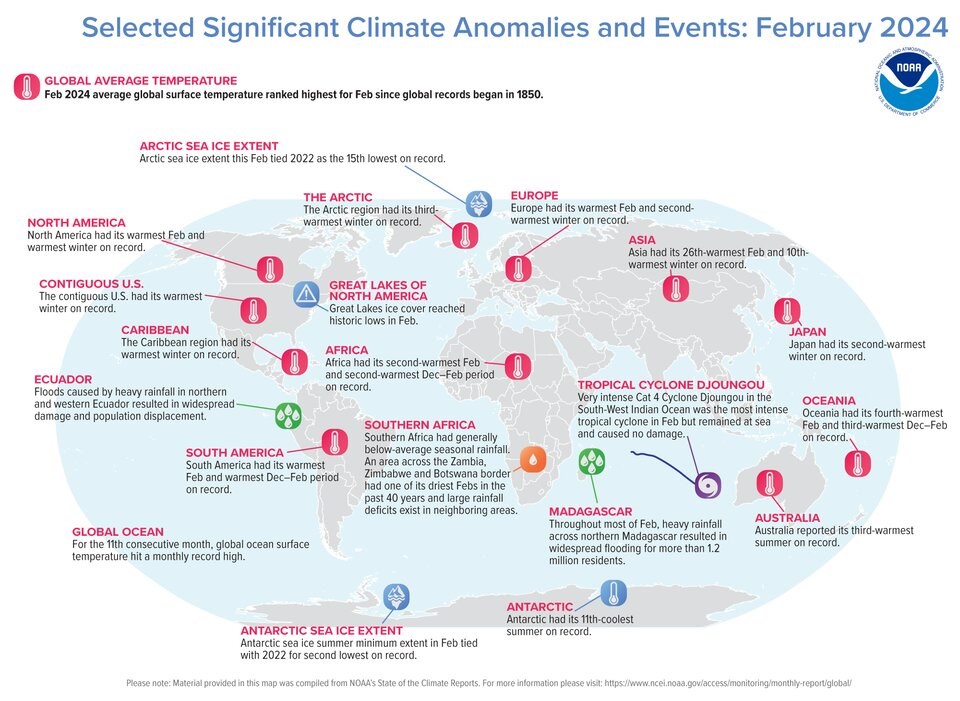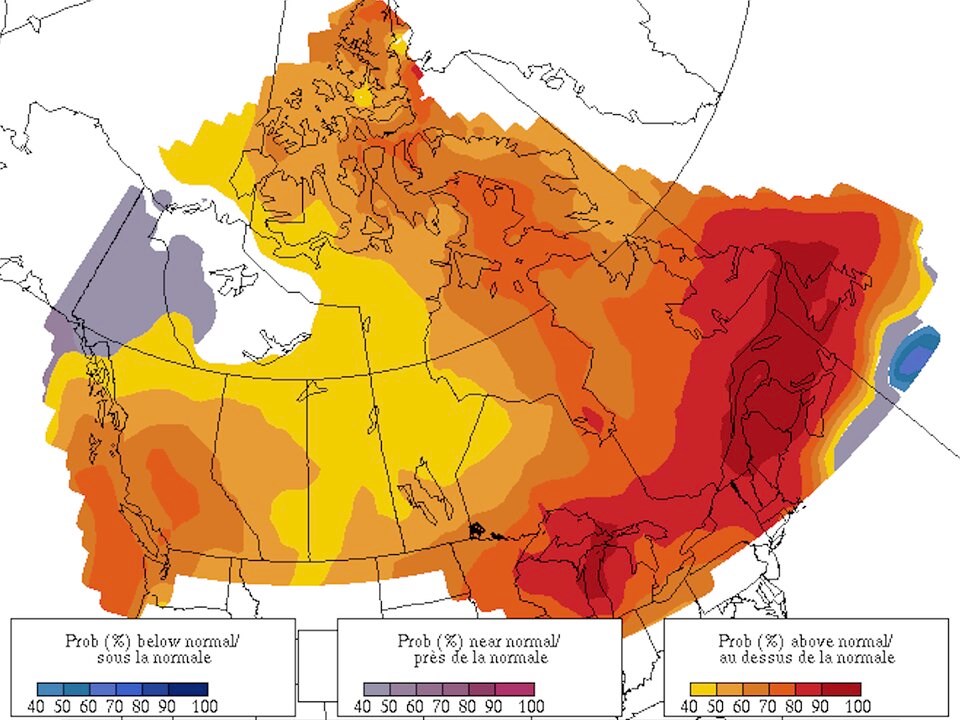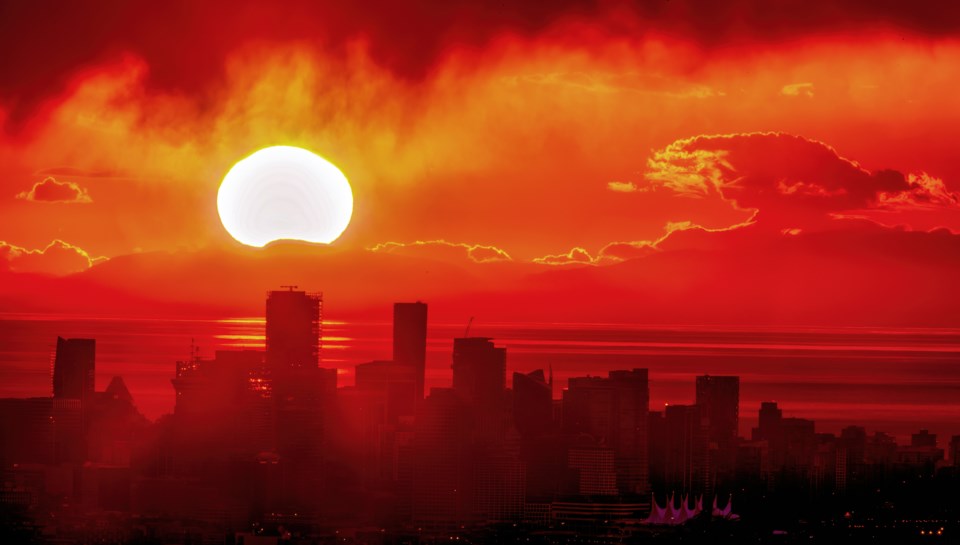Canada’s winter has officially gone down as the warmest on record, with average temperatures spiking 1.1 degrees Celsius above the previous record.
Bob Whitewood, a climatologist with Environment and Climate Change Canada, said he used observational station data to confirm this year’s winter was 5.2 C above the long-term average winter temperature. The previous warmest winter in 2010 was 4.1 C above average.
“Clearly, no one has seen a winter like this in Canada,” Whitewood said. “Clearly, this is an indication that things are changing.”
The warm winter was the result of a number of factors — including El Niño, warm oceans and climate change — all pulling in the same direction at the same time, said David Phillips, senior climatologist with Environment and Climate Change Canada.
“It was like pulling in a tug-of-war but with all the force on one side,” he said. “It is shocking. That isn’t even close to the previous warmest. I get excited by a tenth of a degree. But when the previous one was a whopping 1.1 C cooler? This is astounding. It’s a head-shaker.”
Nathan Gillett, a research scientist with the Canadian Centre for Climate Modelling and Analysis, said that his team recently found Canada’s winters are warming faster than any other season and that the trend is mostly due to human-caused climate change.
“This year, El Niño has made it warmer than usual,” Gillett said. “But my best guess is that human-induced climate change has made the bigger contribution to the warmth this year.”
Get used to winter temperature swings, say experts
The winter season has been dominated by swings from dry, warm spells to deep freezes. Across much of the country, a lack of early season snowfall was followed by an unseasonably warm early January.
Many ski hills across British Columbia struggled to open due to a lack of snow. That included Troll Ski Resort near Quesnel, B.C, which was forced to cancel ski and snowboard events for the B.C. Winter Games.
“We may be the snowiest country in the world, but our winters aren’t what they used to be,” said Phillips.
On the Great Lakes, ice cover reached historic lows this winter, while the Arctic had its third warmest winter on record, according to the U.S. National Oceanic and Atmospheric Administration (NOAA).

Despite being dominated by warm weather, a powerful temperature swing in January froze much of Canada’s west, breaking energy consumption records and obliterating B.C.’s Okanagan Valley grape crop.
Karin Gleason, a NOAA climatologist and the monitoring section chief of the National Centers for Environmental Information, said the drastic swings in temperature this winter had a lot to do with a destabilized polar jet stream — a trend expected to deepen amid a warming climate.
The “wiggly” jet creates more troughs and ridges, this year funnelling arctic outbreaks onto Siberia, while largely transporting warm air north in North America.
“If you’re a recipient of the cold arctic air, that probably means someone to the left and right of you are feeling the equal and opposite effect,” Gleason said.
Drought a 'huge concern'
B.C. and the Yukon had a warmer than average winter, with many stations reaching near but not all-time temperature records, said Armel Castellan, a warning preparedness meteorologist with Environment and Climate Change Canada.
Precipitation was a different story. Chetwynd and Fort Nelson in B.C.’s northeast saw their driest winters on record, with precipitation falling to 43 per cent of normal. Castellan said that’s a big deal when you remember the region has been in a state of drought for 20 months. In 2023, it was site of some of most intense wildfire activity in the country.
“There’s a long duration drought there — coming up on two years,” Castellan said. “That is a huge concern.”
Less than a week away from the spring equinox, Canada’s spring forecast is expected to once again be dominated by above average temperatures from coast to coast. Environment and Climate Change Canada’s seasonal forecast shows much of B.C. with a 60 to 80 per cent chance of hotter than normal temperatures between March and May 2024.

In Vancouver, some experts suggest cherry trees are expected to bloom several days earlier than normal this year. But with early blooms comes early pollen, and Phillips said early budding trees are already making allergies much worse than normal.
Elsewhere in B.C. and Alberta, a lack of snowpack has also raised serious concerns that drought could reduce access to water — for both people and wildlife — and spark a powerful wildfire season.
“The stage is set for a very active spring fire season,” Mike Flannigan, a wildfire researcher from Thompson Rivers University told Glacier Media this week.
Global temperatures unlike anything ever recorded
The hot, dry conditions are not limited to Canada, but are all part of what NOAA scientists described Thursday as the northern hemisphere’s warmest meteorological winter in the administration’s 175-year climate record.
Globally, February has also gone down as the world’s warmest on record — 1.4 degrees Celsius above the 20th century average of 12.1 C — and the ninth month in a row that has broken all-time high temperature records.
North and South America, as well as Europe had their warmest February on record, while the month ranked as Africa’s second warmest February.
And at sea, global ocean surface temperatures have hit a monthly record high for the 11th consecutive month. That could herald big problems on a number of fronts.
By absorbing vast quantities of heat, the ocean acts as a buffer, absorbing atmospheric carbon and heat generated by human-caused climate change. As ocean water warms, it expands, adding another dimension to sea level rise.

Off the west coast of North America, the probability of sea surface temperatures climbing above normal has spiked to 100 per cent over the coming months.
Such temperatures threaten everything living within it — from coral reefs and salmon to humpback whales, whose numbers along the Pacific coast have faced a 20 per cent decline in recent years.
On Thursday, a NOAA forecast signalled there could be some respite as El Niño’s influence gives way to a La Niña by the fall.
Still, said Gleason, even moving into a La Niña pattern would take time for the ocean to respond. Her team’s models show 95 per cent confidence 2024 will be the first, second or third warmest year on record. Gleason said the magnitude and the speed temperatures have ramped up over the last year have caught her and many other scientists off guard.
“The proof is there,” added Phillips. “There’s no denying the world is warmer and Canada is clearly a part of that.”





